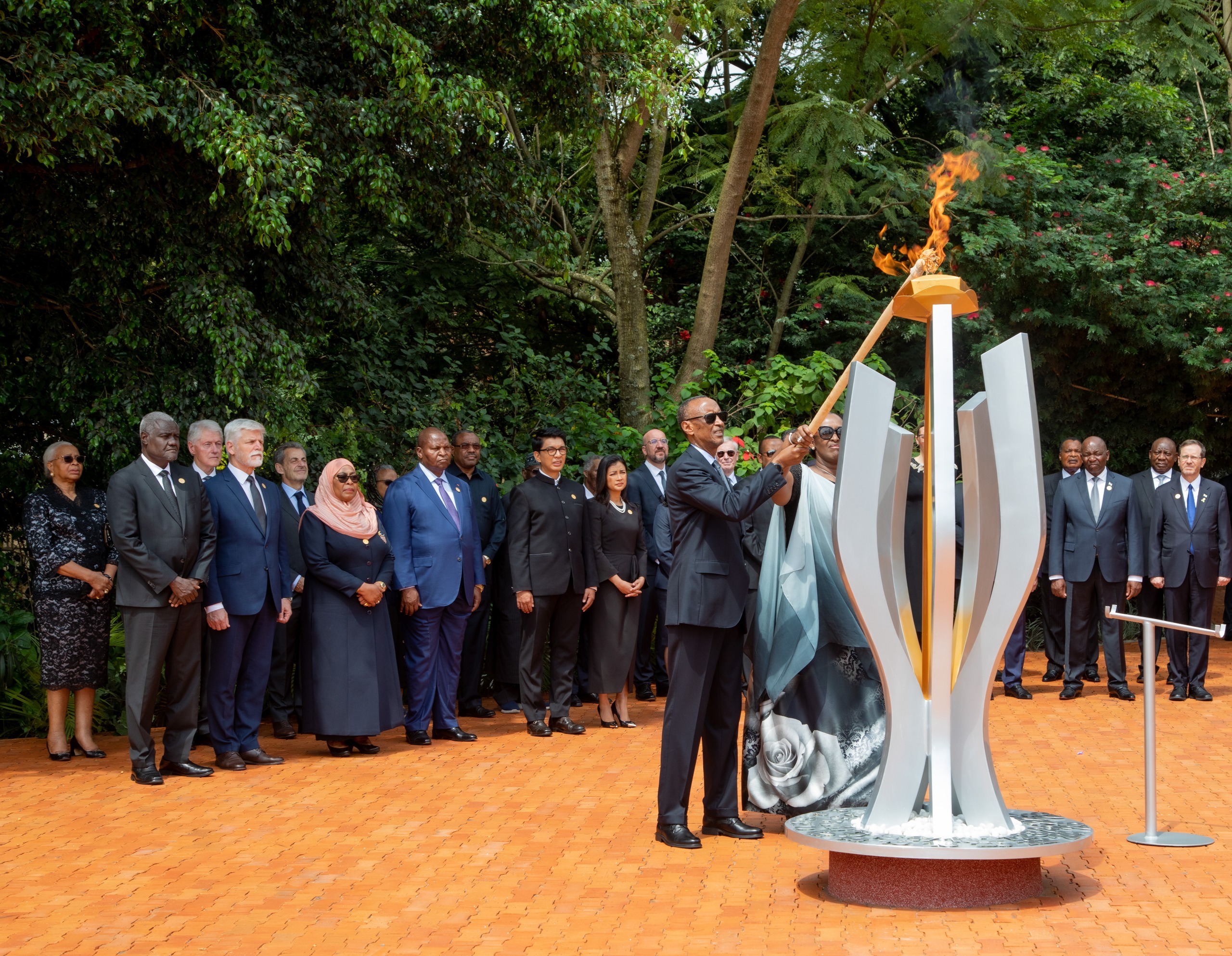World leaders from across the globe convened in Kigali, Rwanda, to pay homage to the victims of the 1994 Genocide against the Tutsi.
The solemn gathering witnessed the presence of over a dozen current and former Heads of State, including notable figures such as South African President Cyril Ramaphosa, Czech Republic President Petr Pavel, and former US President Bill Clinton.
Together, they united with Rwandan President Paul Kagame to honor the memory of those lost by laying wreaths and igniting the flame of remembrance at the Kigali Genocide Memorial.
This poignant act marked the commencement of Kwibuka30, a nationwide initiative to commemorate the tragedy that befell Rwanda three decades ago.
The term “Kwibuka 30” holds profound significance, translating to “to remember” in Kinyarwanda, the national language of Rwanda.
Reflecting on Tragedy, Embracing Resilience
The genocide, which unfolded on April 7, 1994, resulted in the brutal slaughter of over a million Tutsi individuals within a harrowing span of just 100 days, casting a dark shadow over Rwanda and the world at large.
Shockingly, the international community stood witness to the unfolding horror, as a minimal United Nations peacekeeping force remained passive in the face of unspeakable atrocities, a failure that continues to haunt global conscience to this day.
In his impassioned address, President Kagame underscored the profound lessons learned from Rwanda’s harrowing ordeal.
He emphasized the imperative for Africans to assert the value of their lives, rejecting external dictates and embracing the responsibility to safeguard their own destiny.
Kagame’s resolute stance against the politics of ethnic populism resonated strongly, affirming Rwanda’s unwavering commitment to fostering unity and combating divisive ideologies.
Global Solidarity in Commemoration
As a poignant symbol of international solidarity, iconic landmarks worldwide will illuminate in the vibrant hues of the Rwandan flag, echoing the shared commitment to remembering the victims and supporting Rwanda’s journey of healing and reconciliation.
Notably, four memorials commemorating the Genocide against the Tutsi have been recently inscribed as UNESCO World Heritage Sites, serving as enduring testaments to the resilience of the human spirit amidst unspeakable tragedy.
Also Read: Tutsi and Hutu History – The Rwandan Genocide
A Time for Reflection and Renewed Resolve
As Rwanda marks this historic milestone, it offers a poignant opportunity for introspection and renewed resolve.
It is a time to honor the memory of those lost, extend compassion to survivors, and reaffirm the nation’s unwavering commitment to unity, reconciliation, and progress.
Through collective remembrance and shared solidarity, Rwanda continues to emerge as a beacon of hope, inspiring nations worldwide to confront the darkest chapters of history with courage and compassion.
Frequently Asked Questions (FAQs)
- What led to the 1994 Genocide against the Tutsi in Rwanda? The genocide was fueled by deep-seated ethnic tensions and political strife, exacerbated by decades of colonialism and divisive policies that sowed seeds of discord within Rwandan society.
- How has Rwanda commemorated previous anniversaries of the Genocide against the Tutsi? Rwanda observes the annual Kwibuka remembrance period, marked by solemn ceremonies, memorial services, and educational initiatives aimed at honoring the memory of the victims and promoting reconciliation.
- What role does international solidarity play in Rwanda’s journey of healing and reconciliation? International solidarity serves as a source of comfort and support for Rwanda, reinforcing the nation’s efforts to heal from the wounds of the past and build a future founded on unity, peace, and shared humanity.
- How has Rwanda’s approach to commemoration evolved over the past three decades? Rwanda has embraced a multifaceted approach to commemoration, combining remembrance with initiatives aimed at fostering reconciliation, promoting social cohesion, and combating genocide denial and ideology.
- What initiatives has Rwanda undertaken to preserve the memory of the Genocide against the Tutsi for future generations? Rwanda has invested in educational programs, memorial sites, and documentation efforts to ensure that the memory of the genocide is preserved and transmitted to future generations, serving as a testament to the nation’s commitment to “never again.”
- What lessons can the international community learn from Rwanda’s experience with genocide and post-conflict reconstruction? Rwanda’s journey offers invaluable lessons on the importance of confronting the past, promoting accountability, and prioritizing reconciliation and inclusive development to prevent recurrence of such atrocities.
- How can individuals contribute to supporting survivors and promoting reconciliation efforts in Rwanda? Individuals can support organizations working on trauma healing, education, and economic empowerment initiatives for survivors, as well as engage in advocacy efforts to promote peace, justice, and reconciliation in Rwanda and beyond.
